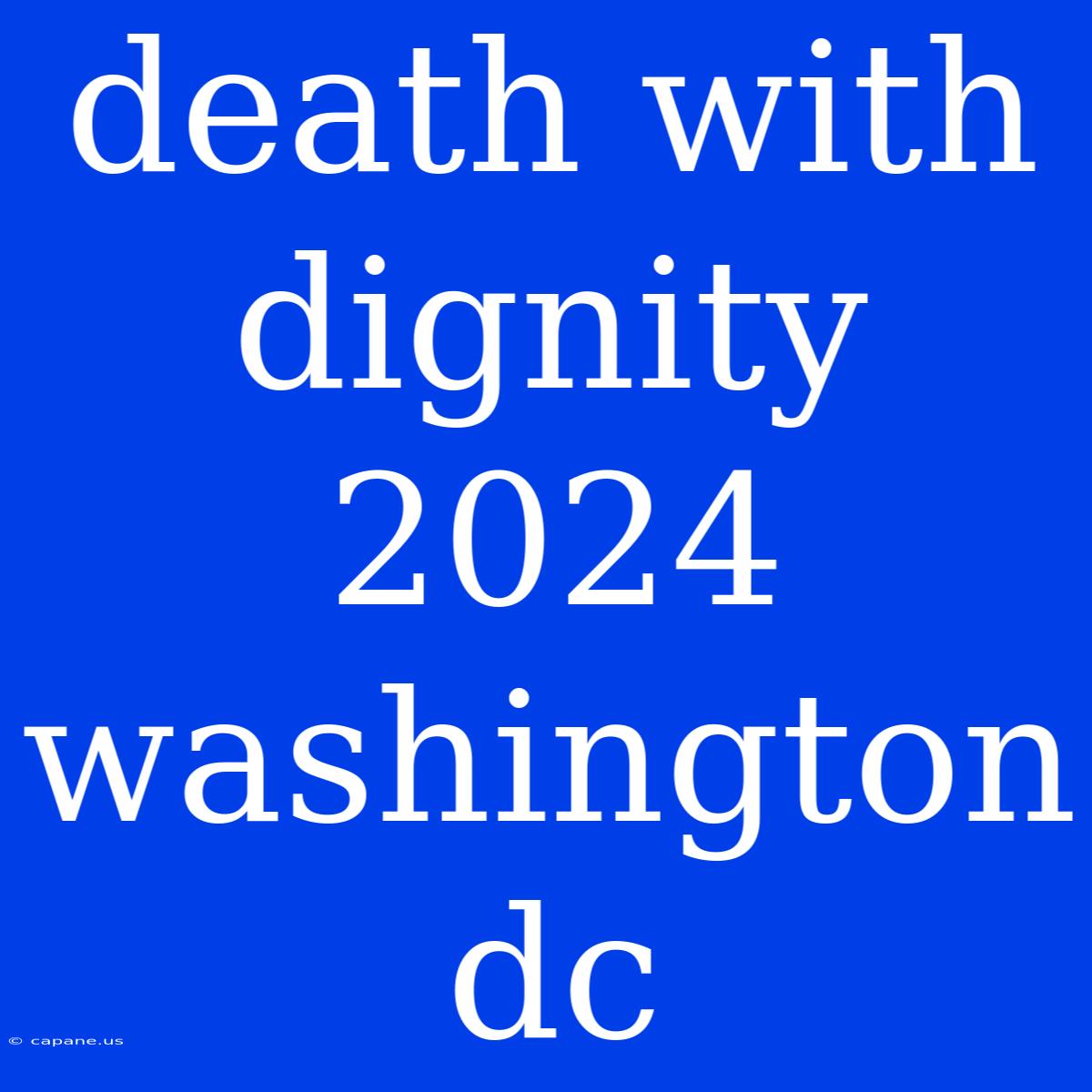Death with Dignity: A 2024 Look at Washington D.C.
Is death with dignity right for everyone? Is it a compassionate choice or a slippery slope? This is the complex debate surrounding the End of Life Options Act in Washington D.C. Editor Note: *The Death with Dignity Act was passed in 2024 and remains a topic of great discussion in Washington D.C. * Understanding this law and its implications is crucial for residents, families, and healthcare professionals alike.
The Importance of This Topic: The discussion on death with dignity is deeply personal and multifaceted. Understanding the nuances of this law and its impact on individuals, families, and healthcare systems is essential.
Our Approach: This article delves into the details of the 2024 Death with Dignity Act in Washington D.C., exploring its provisions, ethical considerations, and implications for those seeking end-of-life options. We aim to provide a comprehensive, objective analysis to inform your understanding and facilitate informed decision-making.
Key Takeaways of the 2024 Death with Dignity Act:
| Key Takeaway | Details |
|---|---|
| Eligibility Criteria | Terminally ill patients with a prognosis of six months or less to live can request medical aid in dying. |
| Independent Physician Confirmation | Two physicians must confirm the diagnosis and prognosis. |
| Mental Capacity Requirement | Patients must be mentally capable of making informed decisions. |
| Waiting Period | A 15-day waiting period is required between the initial request and the final prescription. |
| Patient Self-Administration | Patients administer the medication themselves. |
Death with Dignity: Key Aspects
Eligibility and Process:
The act outlines a rigorous process for patients seeking medical aid in dying. It emphasizes patient autonomy and a focus on relieving suffering in the final stages of life. The primary goal is to provide a compassionate option for those who wish to control their final moments.
Facets of Eligibility and Process:
- Terminal Illness: Patients must be diagnosed with a terminal illness with a prognosis of six months or less to live.
- Informed Decision: Patients must be mentally capable of making an informed decision about their end-of-life care.
- Medical Confirmation: Two physicians must confirm the diagnosis and prognosis.
- Request Process: Patients must submit a written request to a healthcare provider, followed by a 15-day waiting period.
- Self-Administration: Patients are solely responsible for administering the medication.
Ethical Considerations:
The debate surrounding death with dignity raises numerous ethical considerations. Concerns range from the potential for coercion to the possibility of a slippery slope toward broader euthanasia practices.
Facets of Ethical Considerations:
- Patient Autonomy: This aspect supports a patient's right to make choices about their medical care, even in the face of death.
- Physician's Role: The act requires physicians to ensure the patient's informed decision-making process and administer the medication. This highlights the ethical challenges for healthcare professionals.
- Slippery Slope: Critics argue that legalizing medical aid in dying could lead to a broader acceptance of euthanasia, potentially undermining the sanctity of life.
- Coercion and Vulnerability: Concerns exist about the potential for coercion or undue influence, particularly on vulnerable individuals.
Death with Dignity: FAQ
What is the difference between assisted suicide and medical aid in dying?
While often used interchangeably, these terms have distinct meanings. Medical aid in dying emphasizes a patient's autonomy in the final stages of life. Assisted suicide implies a more passive role for the patient.
Who is eligible for medical aid in dying in Washington D.C.?
Only terminally ill patients with a prognosis of six months or less to live are eligible. The decision must be made by the patient themselves, not a family member or friend.
Can a physician refuse to participate in medical aid in dying?
Yes. Physicians have the right to refuse to participate in medical aid in dying based on their personal beliefs.
Is it possible to revoke the request for medical aid in dying?
Yes. Patients can revoke their request at any time.
What are the alternatives to medical aid in dying?
Palliative care, hospice care, and end-of-life counseling are other options that provide comfort, support, and pain management.
Is there a legal risk for healthcare professionals involved in medical aid in dying?
The act provides legal protection for healthcare professionals who comply with its provisions.
Tips for Navigating Death with Dignity
- Open communication with loved ones: Discussing end-of-life wishes is crucial for loved ones to understand and support your decisions.
- Seek information from multiple sources: Explore resources provided by healthcare providers, advocacy groups, and legal professionals.
- Consult with a trusted physician: Discuss your options and concerns with a physician you trust.
- Seek support from loved ones and friends: Connect with loved ones who can offer emotional support and practical assistance.
- Be aware of the legal and ethical implications: Understand the requirements of the Death with Dignity Act in Washington D.C.
Understanding Death with Dignity in Washington D.C.
The 2024 Death with Dignity Act represents a significant step in the ongoing conversation about end-of-life choices. It provides a legally sanctioned option for terminally ill individuals who wish to control the circumstances of their death. The act's implementation is expected to spark further debate and discussion about the ethics, societal implications, and personal choices surrounding end-of-life care.
A Closing Note: The decision to pursue medical aid in dying is deeply personal. It requires a thorough understanding of the law, the available options, and the potential implications. Open communication, careful consideration, and access to accurate information are essential for navigating this complex and emotionally charged topic.

